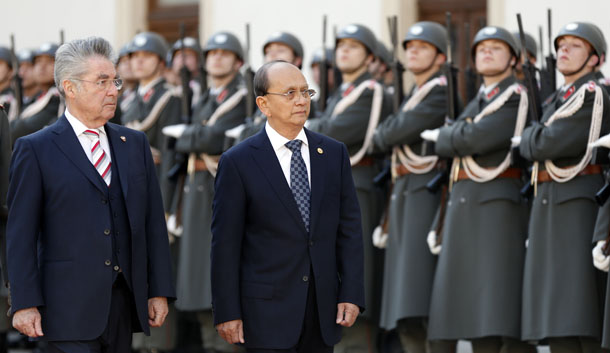LONDON — President Thein Sein, the first leader of Burma to visit Britain in more than a quarter of a century, will hold talks on Monday with Prime Minister David Cameron, who is under pressure to confront him on human rights.
Thein Sein is due to talk trade, aid and democracy with Cameron and his ministers during a two-day visit at a time when Burma is opening up its oil, gas and telecoms sectors to foreign investors, with further liberalization likely.
Thein Sein, a former military commander, is trying to get the West to help Burma’s economy recover from decades of military dictatorship, Soviet-style planning and international sanctions.
Western leaders have praised him for ending the house arrest of opposition leader Aung San Suu Kyi, releasing some political prisoners, and allowing the opposition to contest an election.
But they want him to loosen further the military’s grip on the mineral-rich state formerly known as Burma before a 2015 presidential election which the British-educated Suu Kyi hopes to contest.
Suu Kyi, a Nobel laureate, visited Britain last year.
Thein Sein is also under pressure to act to protect Burma’s small Muslim minority from inter-ethnic violence.
“Prime Minister Cameron should not miss an important opportunity to press Burma’s president on justice for crimes against humanity committed against the country’s Muslims, the release of remaining political prisoners, or an end to repressive laws,” said New York-based Human Rights Watch.
At least 237 people have been killed in Burma in religious violence over the past year and about 150,000 people have been displaced. Most of the victims were Muslim and the deadliest incidents happened in Rakhine State, where about 800,000 Rohingya Muslims live, according to the United Nations.
Avaaz, a global campaign group, plans a demonstration outside the British Parliament on Monday, saying almost a million people have signed a petition calling for an end to inter-ethnic violence in Burma.
It said the bloodshed risked escalating to become the next Rwanda—a reference to the bloody inter-ethnic violence there in 1994 in which hundreds of thousands were killed.
A spokesman for the British Foreign Office said: “We want to recognize the remarkable reforms of the last 18 months but also to raise at the highest levels our ongoing concerns, particularly about inter-communal and anti-Muslim violence.”
Britain will press Thein Sein to improve humanitarian access, to address accountability for crimes, and to end discrimination against the Muslim Rohingya community, he said.
Cameron visited Burma last year, and Thein Sein, who remains close to the military, this year became the first leader of his country since 1966 to visit the White House.
His British trip is thought to be the first since the late General Ne Win, who ruled Burma for 26 years, visited in 1986.
Thein Sein is expected to visit France afterward.

















